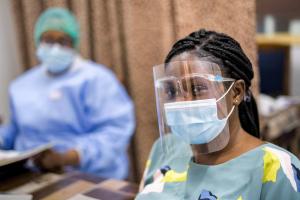International Women's Day 2021: Introduction
International Women's Day celebrates women's achievements. It is also an occasion to rally for women's equality, gender equity and human rights. The theme of this year “Women in leadership: Achieving an equal future in a COVID-19 world” is to recognize the tremendous efforts by women and girls around the world in shaping a more equal future and recovery from the COVID-19 pandemic.
As countries in the African region intensify efforts to control the pandemic, health systems are being challenged. The consequential disruption of services on the already overstretched health systems, and the deviation of resources from essential sexual and reproductive health services (SRH) have increased the vulnerability of African women notably women in remote and rural areas and humanitarian settings.
Reductions in access to and utilization of essential maternal and newborn health (MNH) services during epidemics translate into important increases in the number of women and newborns who suffer complications or die during pregnancy, childbirth and the postnatal period. Even a modest decline of 10% in service coverage during pregnancy and for newborns could result in an additional 28 000 maternal deaths, 168 000 newborn deaths, and millions of unintended pregnancies as family planning services face disruptions.
School closures during the COVID-19 crisis led to another vulnerability for women, exacerbated by, an increase in teenage pregnancy and unintended pregnancies in many countries. Additionally, staying out of school for extended period usually led to greater likelihood of engagement in risky sexual behaviour and increased sexual violence and exploitation. Also, women and girls are increasingly becoming victims in the spike of domestic violence fuelled by economic hardship as millions of people are pushed into extreme poverty.
On the other hand, many women are at the forefront in the fight against COVID-19. In total, the African Region counts more than 770,000 qualified women working in the health sector (doctors, nurses and midwives). They represent about 57% of the health workforce. However, only 28% of them are female doctors. This average is lower than the global average of 40% of female physicians. Hence, the sex distribution of health workers in the African region shows that, although women represent majority of the health workforce, they are often under-represented at senior medical levels.
However, some countries manage to maintain the 50/50 ratio or are getting closer to it. This is the case, for instance, in Benin, Mozambique, Niger, Senegal and South Africa. Others have even managed to reverse the trend with a higher number of female doctors for example, in Zambia, where 18.45% of the doctors are men compared to 81.55% women.
Also, to date, there is still a 31.4% average gender gap that remains to be closed globally. Sub-Saharan Africa has closed 68.0% of its gender gap so far. This result is significant progress since 2019, which leads to a decline in the number of years it will take to close the gender gap, now estimated at 95. Without the equal inclusion of half of the world’s talent, we will not be able to achieve the UN Sustainable Development Goals.
With the support of its partners, WHO is implementing a number of initiatives to ensure women can access services during this time of the pandemic, especially Sexual, reproductive and maternal health services. These services being promoted include self-care services which empower women to be self-providers of services thereby ensuring access to high quality services for women within and outside the health care facility settings. Initiatives to prevent and response to sexual and gender-based violence linked to the pandemic are also being promoted. All of this contribute to maintain the gains already being made at empowering women to reach their full potential buy safeguarding their health and well-being.
Regarding staffing, WHO in the African Region is implementing a policy to ensure that women have the same access to high level positions and responsibility as men. The number of women in high level positions and responsibility have increased since 2015 from 19% to 29 % 2020, whereas achieving the 50/50 ratio remains a priority for the Africa Regional office.
Decision-makers at all levels are encouraged to maintain a minimum package of sexual, reproductive and maternal health services during COVID-19 pandemic, to support programs aimed at decreasing unintended pregnancies, teenage pregnancy, and encouraging girls to go back to school and to work towards a better recognition of women's work in the health sector by guaranteeing them equitable access to high level positions and responsibility. Start with providing women with quality training and conducive work environment to advance their skills, knowledge and boost their self-confidence to achieve higher standards in their work and communities.
Team Lead
Reproductive and Maternal Health
WHO Regional Office for Africa
Email : nkurunzizat [at] who.int (nkurunzizat[at]who[dot]int)
Medical Officer
Sexual and Reproductive Health
Email: ouedraogol [at] who.int (ouedraogol[at]who[dot]int)
Tel: +242 06 671 28 28
Technical Officer,
Sexual and Reproductive Health and Rights
WHO Regional Office for Africa, IST for West and Central Africa
Email : asmanic [at] who.int (asmanic[at]who[dot]int)
Technical Officer,
Sexual and Reproductive Health and Rights
WHO Regional Office for Africa, IST for East and Southern Africa
Tel. +47 241 38407
Email: elaminha [at] who.int (elaminha[at]who[dot]int)
Data Manager SRHR
WHO Regional Office for Africa
Tel: +234 803 495 4861
Email: onyiahp [at] who.int (onyiahp[at]who[dot]int)
Chargée de communication en appui aux pays francophones
Bureau régional Afrique de l’OMS
Email : asekpon [at] who.int (asekpon[at]who[dot]int)



